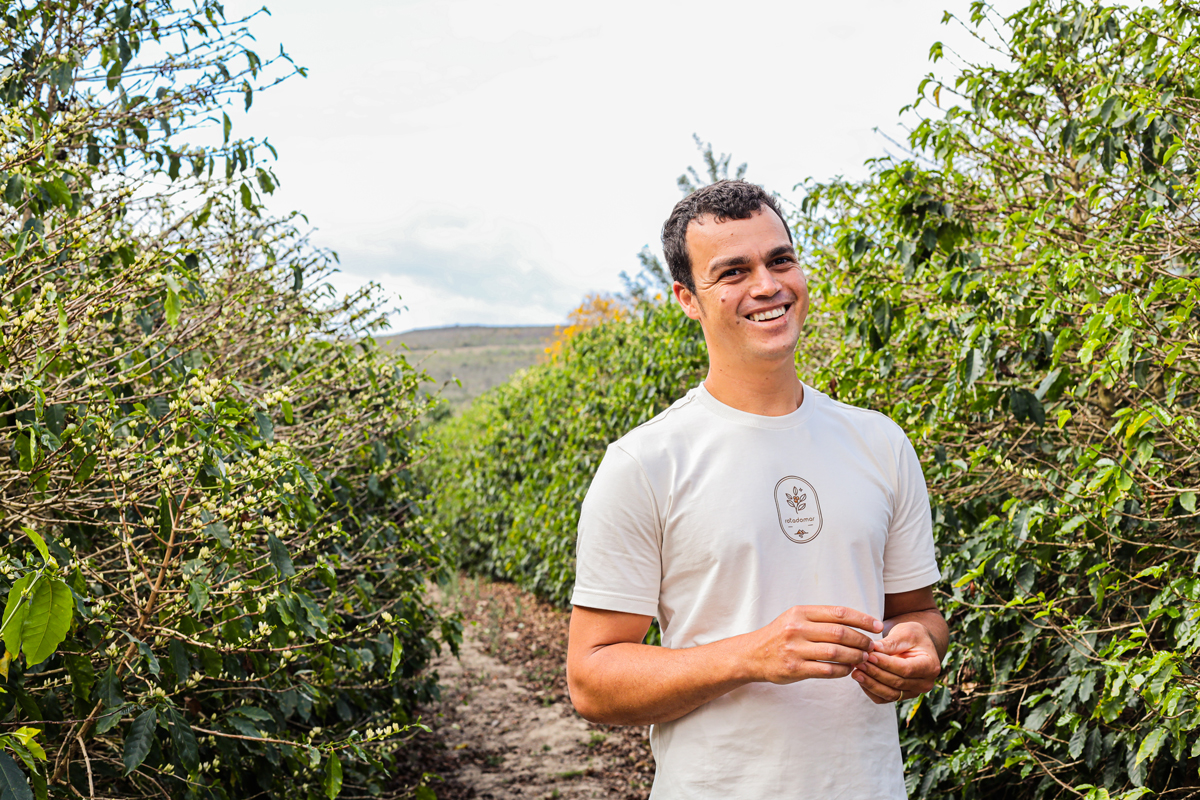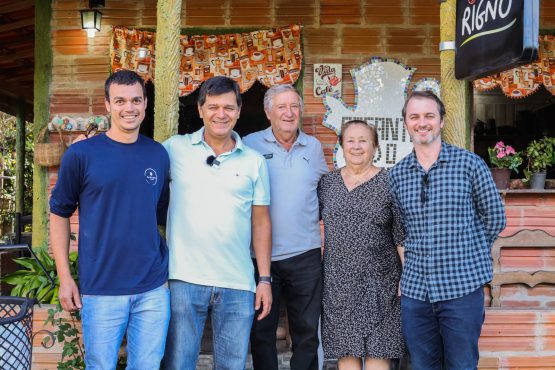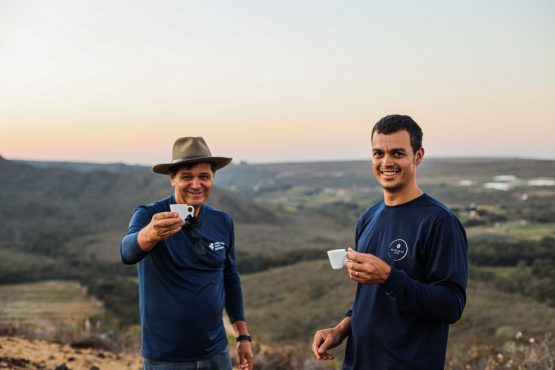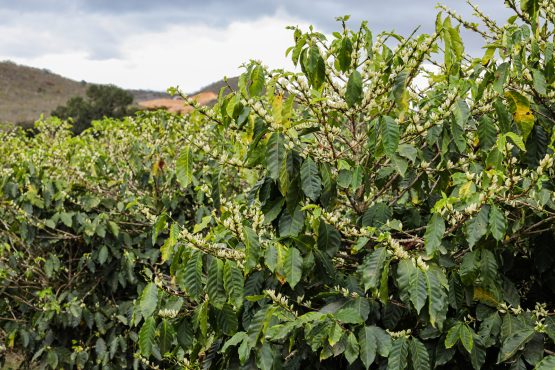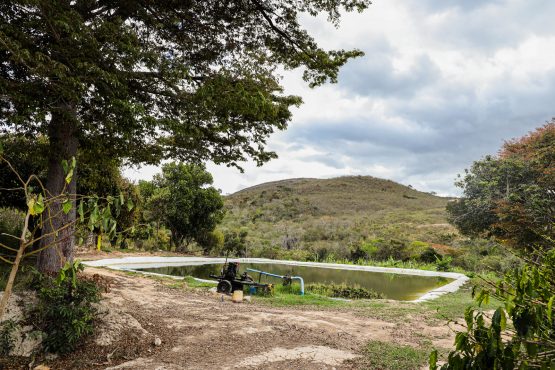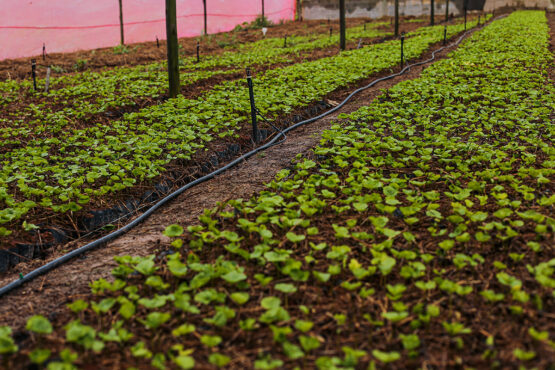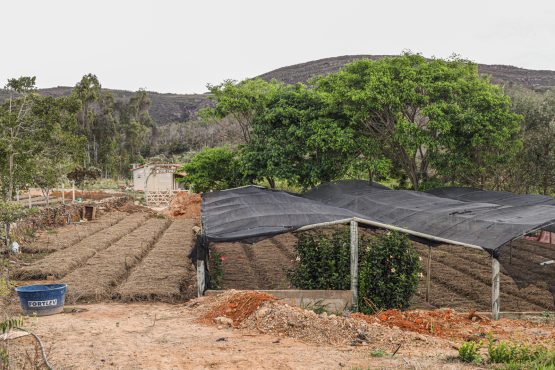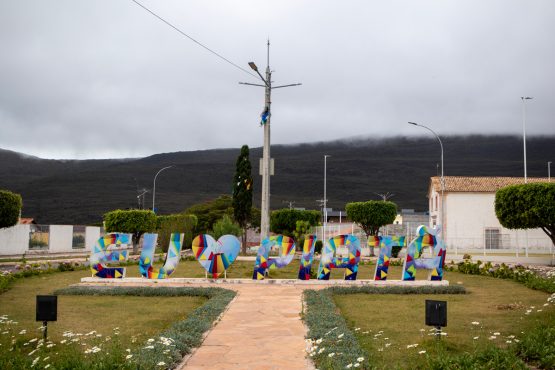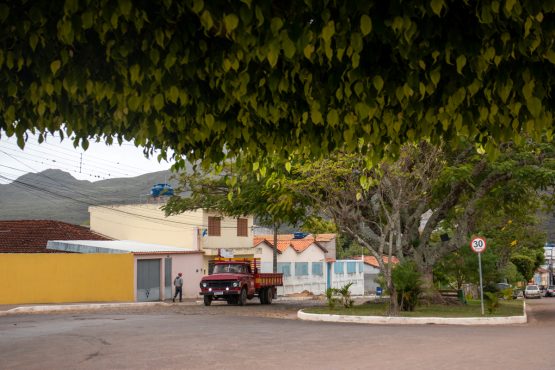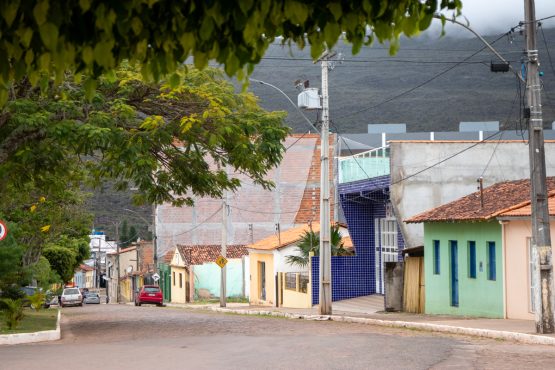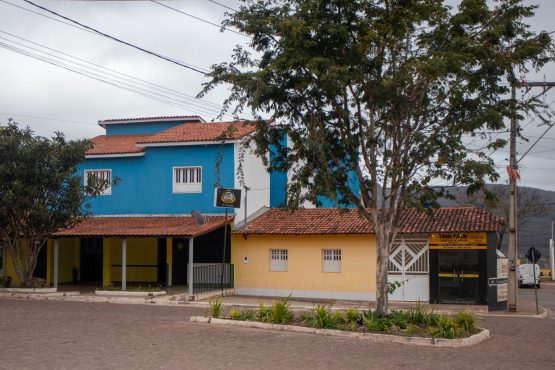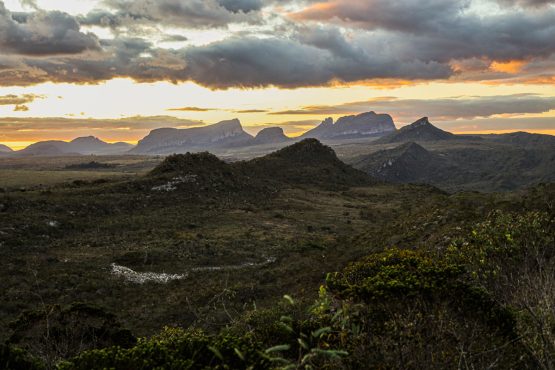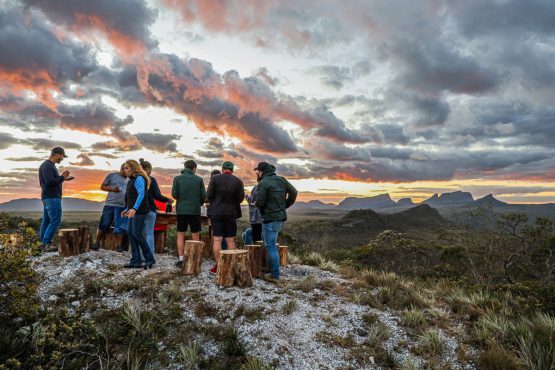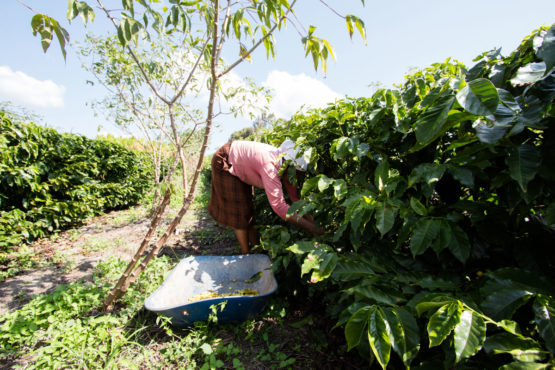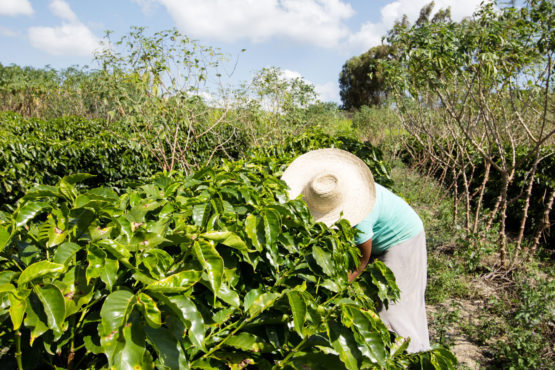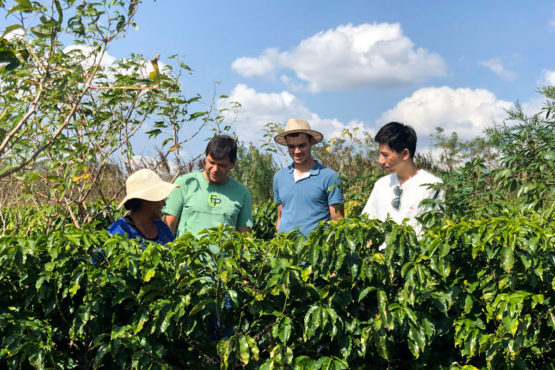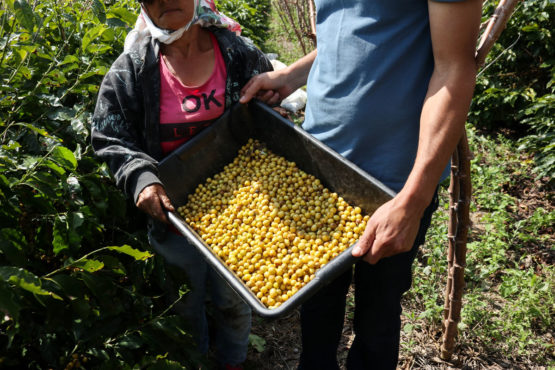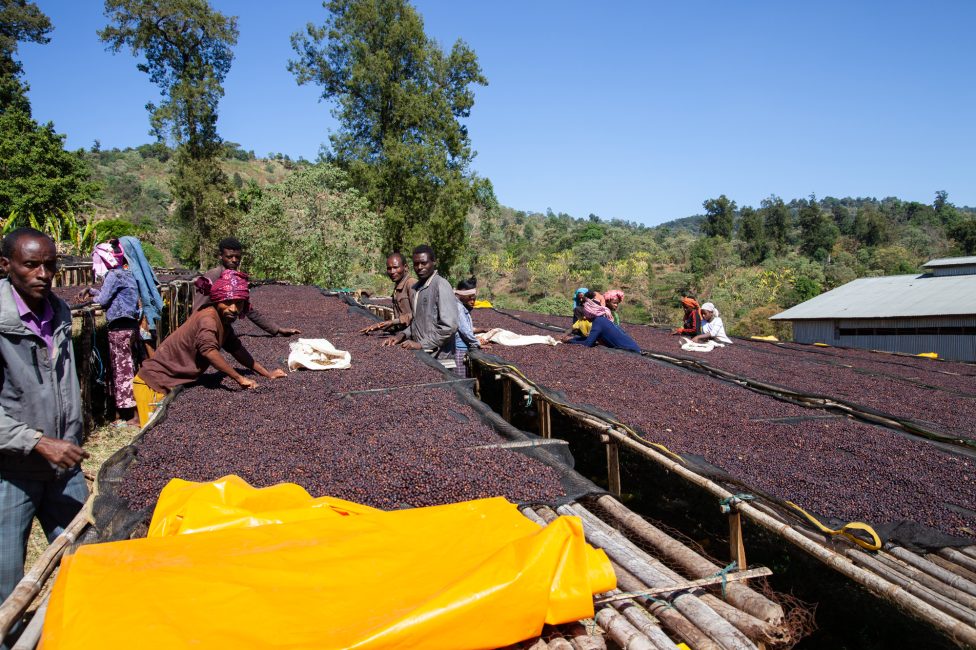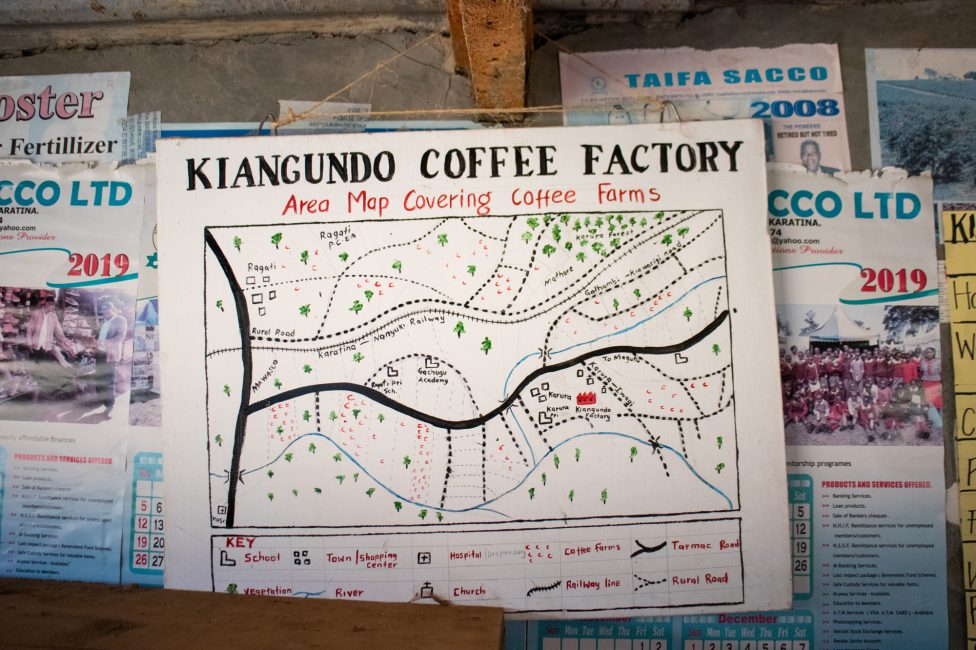Sítio Canaã
Great structure and balance. Golden sultana, creamed honey and pecan pie, with a lingering finish.
This microlot was grown at Sítio Canaã (which translates to “The Promised Land” in Portuguese). The farm lies just outside the small town of Piatã, in Bahia’s Chapada Diamantina region, ranging across 1,280 to 1,340 meters above sea level. Chapada Diamantina translates to “Diamond Plateau” in Portuguese, and for 100 years this area was mined for the gemstones embedded in its cliffs. Today, the region is famous for its specialty coffee.
Sítio Canaã is owned and managed by Kleumon Silva Moreira. Kleumon is young – he’s still in his 30s – but has been working in coffee for well over a decade, alongside his mentor, Antônio Rigno (of São Judas Tadeau). Antônio is widely regarded as the best producer in the region and is famous for his commitment to quality, having achieved many accolades for his coffees in the Cup of Excellence competition along with other quality awards over the years. Rigno has provided advice and guidance for many producers in Chapada, and Kleumon began his career by working by his side for several years learning everything from how to plant and care for the trees through to processing.
In 2016, using all of his savings along with a small loan from the bank (for which Antônio was his guarantor), Kleumon put together enough to establish his own coffee farm. He purchased a 10-hectare plot of land and began planting it with a wide range of varieties, including Topázio, Catuaí, Obata, Bourbon, Paraiso, Arara and Acauã (Kleumon’s favourite!). Since then, Kleumon has been able to buy more land to expand the estate, with the most recent addition being a fifteen-hectare plot in 2022.
Kleumon is a conscientious producer and meticulous in the way that he approaches every aspect of his plantation. Each of the trees at Sítio Canaã is carefully planted 60cm apart and in rows that are 3.3m apart, mirroring the precision and best practices from Antônio Rigno’s farms. To optimise and supplement his income while his coffee trees fully mature, Kleumon has also planted sugarcane, passionfruit, and strawberries — but as his coffee production grows, he is slowly moving away from these crops (though he enjoys producing cachaça and panela bricks for his own consumption). The property also includes a water reserve, which Kleumon relies on heavily during years when the region is experiencing a drought.
Along with his farm, Kleumon has also established a successful and healthy nursery of coffee seedlings, to continuously expand the number of trees planted in his property, as well as to sell to other producers in the region. Over the years, the sale of seedlings and young coffee trees to other producers in Piatã, and to larger companies like Fazenda Progresso, who are seeking to expand in the area has become an important source of income for Kleumon and his family. Because Canaã already grows the varieties that are for sale, producers can visit to see how they perform on the local soil, and to get an indication of the cup profile they can expect. Each May, Moreira receives orders from potential customers, and then grows their seedlings over the course of six to seven months. All work is done manually, by Kleumon and a team of around ten experienced and specialised workers who travel from Minas Gerais for the task.
Kleumon also manages day-to-day operations at Silvio Leite’s estate Cerca de Pedras (which is down the road from Canaã) and serves as Silvio’s right-hand person in town. In this role, Kleumon manages the estate’s admin work and is responsible for all the farming and processing decisions made. Throughout the year, Moreira visits other producers who work with Silvio in the region, providing them advice and assisting in their transition to solely producing specialty grade coffee. Kleumon’s love for Piatã and connection to its terrain is evident when spending time with him — he loves brewing coffee outdoors and hiking the hills that surround Sítio Canaã on his days off.
Kleumon represents the next generation of coffee producers in Piatã and continues to impress with his considered and progressive approach to coffee production. We have purchased his complete production every year since his first harvest in 2018 — and we hope to continue to do so for many years to come. When we first met him, Kleumon was quiet and reserved, and his focus was solely on establishing his farm. As he continues to accomplish more with Sitio Canaã and gain the respect of his neighbours and fellow coffee producers, Kleumon has grown in confidence, and we now count him as a dear friend.
In 2019, using their earnings from coffee, Kleumon and wife Diana were able to buy land in Piatã town to build a house, where they now live with their two children. When talking about the dreams and goals for their future, the couple share that they have no intention of leaving the specialty coffee industry, and hope to plant more trees and continue to expand the amount of coffee they grow.
ABOUT PIATÃ
Located at the foot of the Chapada Diamantina mountain range, Piatã is a unique growing region in Brazil’s Bahia state. The coffees produced here tend to be floral, sweet and complex, and noticeably distinct from those grown elsewhere in Brazil. There are two main factors behind this: coffee grows at elevations of up to 1,400 meters above sea level, which is high for the country; and temperatures range from about 2°C to 18°C in winter, some of the lowest in Brazil. Combined, the high elevation and cool climate are key in slowing down the maturation of the coffee cherries, leading to an increased concentration of sugars in the bean. The result is a cup profile that is bright, transparent, and distinctive. Piatã’s relative proximity to the Equator line ensures the region’s coffee trees can experience such drastic conditions without being affected by frost, unlike other, more traditional coffee-growing regions in the country.
Piatã’s exceptional natural characteristics also contribute greatly to the coffees’ profile. In the distant past, the whole of Chapada Diamantina was completely under water, slowly eroding over millions of years — leaving behind soil that is nutrient-rich and slightly soft. This soil, along with the above-average local humidity, is home to a healthy and diverse ecosystem that includes some 1,600 individual plant species. While the highlands of Chapada are rugged and dry, the area surrounding Piatã is filled with streams, waterfalls and even swamps that, in most years, provide plenty of water for irrigation and agriculture.
While coffee production is on the rise in Piatã, it is still very much a developing industry. Locally produced lots didn’t gain recognition for quality among Brazilian buyers until the 1990s. This recognition led to the establishing of the ASCAMP growers’ association in 1998, which was tasked with assisting growers who had land, but few resources. Over the next decade, cooperatives and other farmer groups were founded, playing a pivotal role in elevating the coffees grown and processed in the region. Piatã went on to be internationally recognised for its high quality in 2009, when five of the top 10 spots in Brazil’s Cup of Excellence came from this small corner of Bahia. The region’s dominance in the competition has continued every year since, particularly in 2016 when an astounding 19 of the 24 winning lots came from Piatã, and again in 2022, when 10 local winners were recognised! MCM has been sourcing coffee from this region since 2012, thanks to the support of longtime partner and coffee mentor Silvio Leite. Head here for more on Silvio and the incredible work he’s done in Brazil.
Part of what makes the Piatã region so special is that production is extremely limited, given the scale of the local estates. Farm sizes tend to be relatively small when compared to other producing areas in Brazil, usually just ten hectares or less in size, and are not visible when driving through the outskirts of town (unlike somewhere like Cerrado de Minas in Minas Gerais, where large estates make up most of the landscape). Most growers process their own cherry on site, sticking to traditional methods with little focus on experimentation, with the goal of processing coffee well and ensuring the final cup is sweet and clean. As many producers rely on coffee as their main source of income, simplicity and repeatability are prioritised. Great attention to detail is placed on the post-harvest work, as the region’s cooler temperatures and high humidity pose risks to the drying parchment. To prevent any potential defects in the cup, many local producers have built greenhouses and raised beds, to add a layer of protection without minimising the necessary ventilation for coffee to dry evenly and at a steady rate.
The region of Piatã is the traditional home of the Cariri and Maracá indigenous people, who were defeated during the Portuguese invasion of Brazil in the seventeenth century. While most of the remaining Cariri people were displaced to other regions within the state of Bahia, eventually joining other indigenous communities, the Maracás have a nearby municipality located at their historical capital city, named in their honour. The word “piatã” translates to “hard foot or fortress” in the indigenous Tupi language (which was spoken by most First Nations People along Brazil’s coast). Head here to learn more about beautiful Piatã.
HOW THIS COFFEE WAS PROCESSED
Kleumon ensures cherries were picked by hand only when fully ripe. His picking team was made up of many of his family members, including his mother who lives close by. Once picked, cherries were taken to Cerca de Pedras for processing using the pulped natural process.
After pulping the coffee at Silvio Leite’s brand wet mill, the beans were sun-dried in greenhouses with their mucilage still attached—spread in layers of about four centimetres and raked several times a day. At this stage, the coffee was primarily left in the shade and greenhouses are closed overnight, to slow down and homogenise the drying process. This extra attention to detail is key in improving and ‘saving’ the fructose and all positive attributes found in the fruit that contribute to a higher quality in the final cup, and adds to the longevity of the lot. Once dry, the parchment was taken to Antonio Rigno’s São Judas Tadeu to be dry milled and separated into numbered lots. The sacks of parchment were later stored and rested at a purpose-built warehouse at Fazenda Progresso, to be prepared for export.
